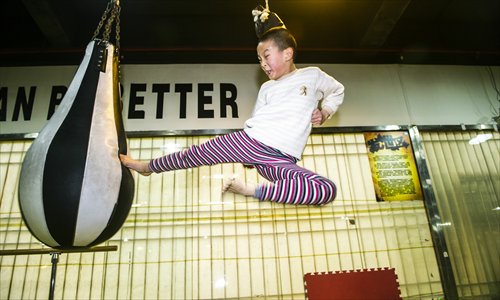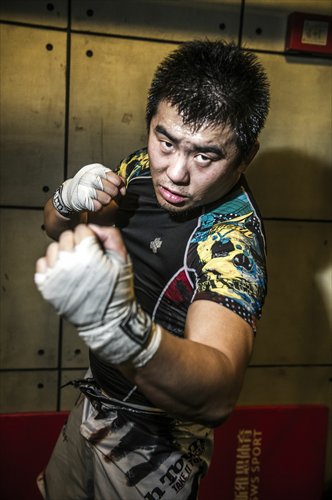Great brawl of China

Xu Xiaodong (front) wrestles with a student at the Beijing MMA Association on January 9. Photo: Li Hao/GT
Martial arts have a storied history in China, with various fighting styles of kung fu having developed in the country over past centuries. But a new combat sport is throttling China in the modern age, even if it involves more blood and real-life injuries than are normally seen in kung fu action films.
Mixed martial arts (MMA), a combat sport that combines the fighting styles of jujitsu, wrestling, judo, karate, kickboxing and Muay Thai boxing, has a niche following in China. Fights organized by the world's biggest MMA organization, the Ultimate Fighting Championship (UFC), can be watched online at sites including PPTV, Sohu, Sina and QQ. Up until recently, MMA struggled for years for support in China from the government-run sport system that has historically nurtured athletes of Olympic sports.
However, all that changed on December 22, 2013, when the Beijing MMA Association opened in Shichahai, home to a school of prodigies in various Olympic sports overlooking the city's scenic Houhai lake district.
Backed by the Beijing Municipal Sports Bureau, the Beijing MMA Association is the Chinese mainland's first MMA organization. Its team of administrators includes China's most famous MMA fighter Zhang Tiechuan, an ethnic Mongolian appropriately nicknamed "The Mongolian Wolf" who competes in the UFC's lightweight division.

Xu unwinds his hand wraps at the end of a workout at his Battle Club gym. Photo: Li Hao/GT
Stepping into the ring
The director of the Beijing MMA Association is Xu Xiaodong, a straightforward talker with a lean yet solid build. "I was trained as a freestyle fighter at the Beijing Shichahai Sports School, but I found that [MMA] suited my personality best. The sport taps into the aggressive side of human nature through hand-to-hand combat," said Xu, 35.
Xu, who also runs two MMA clubs in Beijing, said the 300-member Beijing MMA Association is a division of the Beijing Boxing Federation.
"Since boxing is an Olympic sport, it gets funding from the government. MMA isn't an Olympic sport and there are few professional fights held at MMA clubs and gyms in China. The only MMA tournament we have held was the Legend Fighting Championship in Macao, but that was scrapped two years ago because of insufficient sponsorship," said Xu, referring to a tournament participated in by fighters from across the Asia-Pacific region.
Xu coaches MMA fighters as young as 12 at his Battle Club gym in Chaoyang district, but said 15 is a better age for youngsters to take up the sport.
"Children who learn MMA are usually introduced to it by parents who love the sport. We have customized courses for children. No matter how careful they are, there is always a high risk of injury. To ensure young practitioners' safety, we offer mild beginner courses," he said.
In a sign that you're never too old to take up the sport, Xu also teaches a 52-year-old at Battle Club.
"I'm glad to see people aren't afraid to try the sport, but for those over 45 we tend to focus more on improving their conditioning than actual fighting skills," Xu said.
Of the 400 members of the Jinsong gym learning MMA, 95 percent are males.
"Women practice MMA mainly for self-defense," Xu said. "For men, MMA is the kind of sport that requires their poise and cunning to attack their rivals and protect themselves. The goal is to train fighters' entire body strength."

A boy unleashes a flying kick. Photo: Li Hao/GT

Beijing MMA Association director Xu Xiaodong strikes a fighter's pose at his Battle Club gym in Jinsong, Chaoyang district. Photo: Li Hao/GT
Cultural influences on MMA
Xu said one reason MMA hasn't taken off in China to the same degree as in the US is the cultural impediment of Confucianism.
"Virtues revered by Chinese are obedience and humility. Even if being bullied, most Chinese choose to tolerate it and hide their negative emotions. MMA is based on direct confrontation, which has made it difficult for the sport to capture widespread interest in China," he said.
"It is impossible for MMA to have the same popularity as other traditional Chinese martial arts, such as tai chi. People can start tai chi at any age, but I see it more as a form of dancing rather than martial arts per se."
Away from his day job as a project manager with a car tuning company, Frank Zhang has been an avid MMA practitioner since 2011.
"I followed Chinese MMA forums during my college years, but initially didn't dare to try out the sport for myself," said Frank Zhang, 29.
"Fighters in televised MMA bouts mostly attack their opponent's face without any protective equipment, so I hesitated whether to give it a try for a long time."
Frank Zhang decided to start by focusing on Brazilian martial art jujitsu, which he had previously learned. "But I found [jujitsu] was very different from other fighting styles [in MMA]. I sometimes got cold feet when wrestling with my coach. Jujitsu requires a great deal of strength and is a form of close-quarters combat," he said.
After six months of refining his jujitsu, Frank Zhang made his first foray into learning other fighting styles at the Rongda Yisheng gym in Haidian district. "The next style I chose was Muay Thai boxing. It looks fierce, but it isn't as exhausting as jujitsu," he said, adding he has no aspirations to ever fight an opponent in an exhibition bout.
"Compared to Westerners, Asians have weaker strength but better flexibility. Regular weight training is important," he said.

A Muay Thai boxer pounds the pads.Photo: Li Hao/GT
Selling MMA in China
Although the founding of the Beijing MMA Association is a milestone for the sport in China, Xu admitted it is "like a shell" in its current form. The association will face its biggest test in its short history in April when, funding permitted, it plans to organize its first tournament.
In December 2013 around the same time the Beijing MMA Association was established, reality TV show The Ultimate Fighter China premiered.
Featuring 16 competitors divided into two teams coached by Zhang Tiechuan and fellow Chinese professional MMA fighter Ao Hailin, the program pits fighters against each other in a knockout competition.
The final winner will be awarded a UFC contract, allowing him to fight on the world's biggest MMA stage.
Fred Thomassen, a 34-year-old assistant coach on The Ultimate Fighter China, is optimistic about the future of MMA in the country.
Thomassen, who runs his own gym in Wangjing, Chaoyang district, said he expects more MMA promoters to realize the untapped potential in China. "It has its ups and downs," he said of MMA's fortunes in China. "People come and go, but MMA has a growing fan base here."
Rather than welcoming publicity The Ultimate Fighter China has given to MMA in the country, Xu was blunt in saying "it sucks" on account of its crass entertainment value.
"I foresee declining viewer ratings in coming seasons," he scoffed.
Although acknowledging the credibility Zhang Tiechuan lends the program, Xu said the star's faltering Putonghua and use of MMA terminology such as "anaconda choke" and "arm-triangle choke" further alienates audiences unfamiliar with sport.
But Xu's disdain for the TV show could be explained by his own sour grapes for not gaining wider recognition during his fighting career.
"I never competed in any big tournaments or held an impressive ranking," he smirked. "My focus is on promoting MMA to regular people. I will keep trying to do this as long as I have the finance to run my gyms."